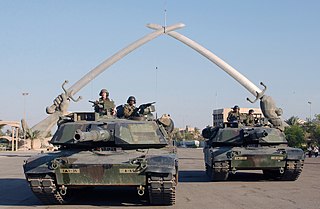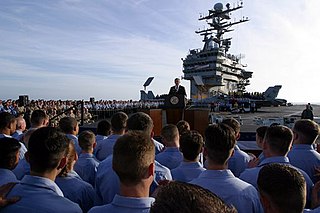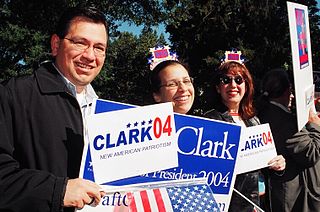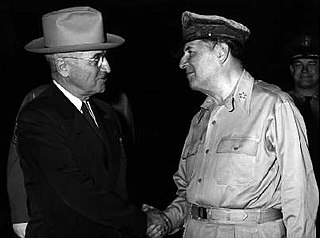
Donald Henry Rumsfeld was an American politician, government official and businessman who served as secretary of defense from 1975 to 1977 under president Gerald Ford, and again from 2001 to 2006 under President George W. Bush. He was both the youngest and the oldest secretary of defense. Additionally, Rumsfeld was a three-term U.S. Congressman from Illinois (1963–1969), director of the Office of Economic Opportunity (1969–1970), counselor to the president (1969–1973), the U.S. Representative to NATO (1973–1974), and the White House Chief of Staff (1974–1975). Between his terms as secretary of defense, he served as the CEO and chairman of several companies.

Omar Nelson Bradley was a senior officer of the United States Army during and after World War II, rising to the rank of General of the Army. Bradley was the first chairman of the Joint Chiefs of Staff and oversaw the U.S. military's policy-making in the Korean War.

The United States public's opinion on the invasion of Iraq has changed significantly since the years preceding the incursion. For various reasons, mostly related to the unexpected consequences of the invasion, as well as misinformation provided by US authorities, the US public's perspective on its government's choice to initiate an offensive is increasingly negative. Before the invasion in March 2003, polls showed 47–60% of the US public supported an invasion, dependent on U.N. approval. According to the same poll retaken in April 2007, 58% of the participants stated that the initial attack was a mistake. In May 2007, the New York Times and CBS News released similar results of a poll in which 61% of participants believed the U.S. "should have stayed out" of Iraq.

Significant opposition to the Iraq War occurred worldwide, both before and during the initial 2003 invasion of Iraq by a United States-led coalition, and throughout the subsequent occupation. People and groups opposing the war include the governments of many nations which did not take part in the invasion, and significant sections of the populace in those that did.

William Kristol is an American neoconservative writer. A frequent commentator on several networks including CNN, he was the founder and editor-at-large of the political magazine The Weekly Standard. Kristol is now editor-at-large of the centre-right publication The Bulwark.

The 1998 bombing of Iraq was a major four-day bombing campaign on Iraqi targets from 16 to 19 December 1998, by the United States and the United Kingdom. The contemporaneous justification for the strikes was Iraq's failure to comply with United Nations Security Council resolutions and its interference with United Nations Special Commission inspectors who were looking for weapons of mass destruction.

The Nayirah testimony was false testimony given before the United States Congressional Human Rights Caucus on October 10, 1990, by a 15-year-old girl who was publicly identified at the time by her first name, Nayirah. The testimony was widely publicized, and was cited numerous times by United States senators and President George H. W. Bush in their rationale to support Kuwait in the Gulf War.

The withdrawal of the United States troops from Iraq began in December 2007 with the end of the Iraq War troop surge of 2007 and was mostly completed by December 2011, bringing an end to the Iraq War. The number of U.S. military forces in Iraq peaked at 170,300 in November 2007.

The U.S. rationale for the Iraq War has faced heavy criticism from an array of popular and official sources both inside and outside the United States. Putting this controversy aside, both proponents and opponents of the invasion have also criticized the prosecution of the war effort along a number of lines. Most significantly, critics have assailed the U.S. and its allies for not devoting enough troops to the mission, not adequately planning for post-invasion Iraq, and for permitting and perpetrating widespread human rights abuses. As the war has progressed, critics have also railed against the high human and financial costs.

The Mission Accomplished speech was a televised address by United States President George W. Bush on the aircraft carrier USS Abraham Lincoln on May 1, 2003.

Lawrence B.Wilkerson is a retired United States Army Colonel and former chief of staff to United States Secretary of State Colin Powell. Since the end of his military career, Wilkerson has criticized many aspects of the Iraq War, including his own preparation of Powell's presentation to the UN, as well as other aspects of American policy in the Middle East.

The Truman Committee, formally known as the Senate Special Committee to Investigate the National Defense Program, was a United States Congressional investigative body, headed by Senator Harry S. Truman. The bipartisan special committee was formed in March 1941 to find and correct problems in US war production with waste, inefficiency, and war profiteering. The Truman Committee proved to be one of the most successful investigative efforts ever mounted by the U.S. government: an initial budget of $15,000 was expanded over three years to $360,000 to save an estimated $10–15 billion in military spending and thousands of lives of U.S. servicemen. For comparison, the entire cost of the Manhattan Project was $2 billion, at the time. Chairing the committee helped Truman make a name for himself beyond his political machine origins and was a major factor in the decision to nominate him as vice president, which would propel him to the presidency after the death of Franklin D. Roosevelt.

The rationale for the Iraq War, both the 2003 invasion of Iraq and the subsequent hostilities, was controversial because the George W. Bush administration began actively pressing for military intervention in Iraq in late 2001. The primary rationalization for the Iraq War was articulated by a joint resolution of the United States Congress known as the Iraq Resolution.

John Robinson Batiste is a retired officer of the United States Army, author, and the co-founder of Batiste Leadership.

In the context of the Iraq War, the surge refers to United States President George W. Bush's 2007 increase in the number of American troops in order to provide security to Baghdad and Al Anbar Governorate.

On January 30, 2007, then-U.S. Senator Barack Obama introduced the Iraq War De-Escalation Act of 2007. The plan would have stopped the 2007 U.S. Troop Surge of 21,500 in Iraq, and would also have begun a phased redeployment of troops from Iraq with the goal of removing all combat forces by March 31, 2008. The bill was referred to committee and failed to become law in the 110th Congress.

The 2004 presidential campaign of Wesley Clark, a retired U.S. Army general who served as Supreme Allied Commander Europe (SACE) from 1997 to 2000, officially began on September 17, 2003. A movement to draft Clark for the Democratic nomination began in April 2003, and was led by activists who felt Clark's military service and criticism of the War in Iraq made him a strong candidate. Prior to announcing his campaign, Clark was not known to have publicly identified with either party.
Timeline of the Iraq War troop surge of 2007

On 11 April 1951, U.S. President Harry S. Truman relieved General of the Army Douglas MacArthur of his commands after MacArthur made public statements that contradicted the administration's policies. MacArthur was a popular hero of World War II who was then commander of United Nations Command forces fighting in the Korean War, and his relief remains a controversial topic in the field of civil–military relations.
The quagmire theory explains the cause of the United States involvement in the Vietnam War. The quagmire theory suggests that American leaders had unintentionally and mistakenly led the country into the Vietnam War. The theory is categorized as an "orthodox" interpretation of the Vietnam War.

















